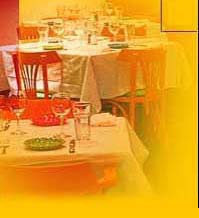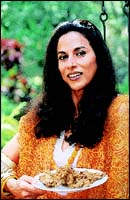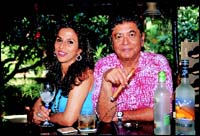


|
|
|
By Shobhaa De Dilip starts talking about food from the moment he opens his eyes. I half suspect, he�s merely taking his early morning gourmet dreams forward. Dilip is an early riser, I am not. When I hear his detailed instructions to Rohini (our faithful domestic), I�m still half-asleep. When we meet at the breakfast table, he is still issuing instructions. These don�t stop even when he leaves the house. Seven minutes later (when he�s bang opposite the fishing nets of Bombay�s ancient Machchimaar Nagar), the phone rings. It�s Dilip with some more instructions. I have yet to finish my second cup of tea, mind you.
For instance, Dilip travels miles and miles in Kolkata looking for the perfect Hing Kachori and Aloo Tarkari. We did just that recently, right after landing in the City of Joy. As is his practice, Dilip had planned the Kachori-Tarkari hunt meticulously. And skipped breakfast on the killer flight (6.30 a.m.). �We�ll eat a Bengali breakfast,� he�d announced firmly. As in most other areas of our marriage, he left one with little choice. What I was not prepared for was the unending Kachori trail that took us from one over-crowded gully to the next, till we managed to locate the famous Kachoriman, in an unnamed hole-in-the-wall, across an old blue mosque right next to the tram-tracks. From the perfect Kachori to the perfect Singhada (samosa) was another 5 km hunt. And then for the matka of Mishti Doi, plus a small carton of soft, yielding, fresh Sandesh. Armed with these delicacies, we went up to our opulent suite at the Oberoi Grand and ordered a kettle of Darjeeling Tea (�Very hot, very light,� Dilip commanded). Yes, it was a memorable breakfast. But, I�m not a breakfast person. Still, being a well-trained wife, I cooed over each mouthful. And wondered how I�d survive a heavy family lunch, followed by a friend�s lavish dinner. I�m happy to report that I ate my way through all three and still had space for a dark bitter Lindt, before going to bed. Lindt is always packed in our travel case just in case there�s an emergency. I don�t go to such lengths looking for my favourite foods, I have to tell you. And my tastebuds aren�t half as sophisticated or cultivated. �That�s because you�re a Maharashtrian,� Dilip says dismissively. �What would you know about great cuisine � your state�s snacks rarely go beyond Batatawadas and Dahi-misal. The only speciality worth talking about is Puranpoli. And even that is over-rated.� Spoken like a true Bong. On the other hand, I do see his point. Even though, till today, when I think of �comfort food�, I go right back to my childhood and start craving for the simple, humble, unpretentious fare from my mother�s kitchen. I do realise that what I�m actually missing is her love and not just her delicious food. Maybe that�s the whole point. Food is love. If you love food, you love, love. I have yet to meet a passionless, cold and aloof person who�s a gourmet. Food is an emotion. Like music. I frequently link the two. When I recall memorable meals, I realise I never judged them in isolation. I can remember them distinctly, because I treasure happy memories of the occasion. Our home in Alibaug is just that � a simple, unpretentious home, that has grown organically and magically over the years. I thank Dilip for creating a small heaven where I have a personal chef (him!) creating one-of-a-kind dishes just for me. Sometimes, I think it�s the family of resident owls that watch over our candle-light dinners-a-deux, which bless the meals. Other times, I give the entire credit to the man who goes to the extent of sending chilled figs to the jetty, to say �welcome�. And follows it up with smoked oysters and fresh asparagus in the garden, as strains of Begum Abida Parveen�s sonorous Sufi waft over the swaying palms.
Cooking outdoors has its own charm � especially since the resident chef can then be close to the bar and take frequent swigs from his single malt du jour. Members of the single malt cult will identify completely when I say that to call a malt a mere whisky is to call Sharon Stone �pretty�. Malts (like cigars) have a distinct personality of their own. There is a specific malt for a specific reason (and season). Only a malt aficionado will appreciate the deep, philosophical reasoning behind that statement. Dilip is a purist, especially when it comes to his Bong cuisine. As is by now pretty well-known (thanks to Simi Garewal�s Rendezvous), Dilip likes his fish to smile. Therefore, smiling fish it has to be � no scowls allowed. Dilip is at his exuberant best in a fish market, examining the expressions on the rows of dead fish and finally settling on the one with the friendliest grin. To me, a dead fish is a dead fish. But then, I�m not a born Bong (only an honourary one). Vegetables that accompany the meat and fish dishes have to be upbeat and cheerful too. �It�s all in the cut,� says Dilip, sounding like Shahab Durazi. It took me a decade to decode that. Even now, I�m not entirely sure which way the slice goes for an Alloo Poshto; am I supposed to dice, cube, chop, what? And why are bhindis cut length-wise for one dish, but into tiny pieces for others? And onions � oops, is it thin slivers for Dolma and chunks for Dalna or the other way around? I guess I�ll never know and never learn. And frankly, does it matter? �Yes, it does,� roars Dilip when I ask. Okay. It does. Bas? This is why we cannot collaborate or cook together. The kitchen ain�t big enough for the two of us. I can�t take the heat. And I�m sure he can�t either. So... picture this: A low-slung, buttery yellow kojagiri moon rising majestically over the imposing silk-cotton tree at the edge of the garden as the master of the house dons his favourite fish-motif apron and heads purposefully towards the grill. The heat-level is modulated according to the glowing coals that have been fired by our man Manohar earlier. Too hot? Where�s the lid? Not hot enough? From the koila ingredients arrive on colourful trays. They are critically inspected, rechecked, approved and discarded, as per the chef�s fussy requirement. Meanwhile, the lady of the house (me!), sits perched on a bar-stool, sipping Chenin Blanc and making soft encouraging noises from time to time. Manohar, the official chef, freezes at a safe distance, fearful of Dilip�s outbursts (�What�s this? Has nobody taught you how to slice onions?�). The family of barn owls protests noisily at the intrusion (they believe the place belongs exclusively to them). While the main dish is simmering and/or sizzling tantalisingly, interesting snacks arrive from the kitchen. What Manohar does brilliantly is a desi version of tempura � the Japanese pakora. His spinach leaves (never chopped, always intact), are done to perfection in a light batter, which Dilip has patented. Paper-thin, crunchy and light, they complement the malt and wine perfectly. �Go easy on the starters,� Dilip cautions. His fish is cooking in its aluminium foil envelope, and he wants me to do justice to it. He should save his breath. I�d be a fool to pass up on the multi-course �fusion� repast he has organised. I look around and see the table neatly, simply and attractively arranged. There are fresh flowers from the garden, and candles everywhere. In the distance, the monstrous Christmas tree (20 feet tall and still growing), seems to be swaying. Oops. But it�s a still night, very, very still. Must be the wine. Manohar raises his eyebrows. �Chappati?� he asks. I nod guiltily. No matter what I�m eating or where, my meal is incomplete without chappatis. Dilip pretends he hasn�t heard. Finally the moment is upon us. The tightly folded edges of the foil are to be opened ceremoniously... anticipation runs high. Will the fish be done? �It had better be,� says Dilip. Once opened, there�s little one can do to salvage this delicate dish. Yessss! The fish is done. And the subtle aromas unleashed suggest it�s going to be delicious. Manohar lurks in the shadows holding my guilty secret � the chappatis. He knows he has had it if he brings them out at the wrong moment. I signal to him to hold on while I rave over the fish. Seriously, it is outstanding. I eat an entire side and leave the rest for Dilip. Only Bengalis know how to relish the head and he�s welcome to it. The day Dilip is cooking at home in Bombay, I give our domestics double doses of Valium. They need to tranquillise themselves in order to survive the master chef�s sessions. Sometimes, I feel he�ll chop their heads off rather than the fish�s. At least fish-heads can be converted into a delicious dish, what would I do with Rohini�s or Rupali�s? On these occasions, I watch a DVD in a cool, air-conditioned room, and wait patiently for the man of the house. He comes in hot and bothered and fuming. �When will these bloody women learn?� he curses. I smile sweetly and turn back to the small screen. Dilip goes in for a shower. By the time he emerges, his mind is already on the single malt and cigar he feels he has earned after toiling in the kitchen. My mind is on the delicately-flavoured Malai Chingri he has prepared, after consulting his mother�s age-old recipe.
Then comes the �fusion� part of our dinner. Komdi cooked Raigad style (in coconut milk) followed by amti and rice. Mutton is invariably done the Bong way (Kosha Mangsho) and goes wonderfully with sour dough bread from the Oberoi. Sounds incongruous? Check it out. In Kolkata, Sunday lunches feature weird combinations � like Chinese Fried Rice and Mutton Curry. We frequently serve it in Alibaug much to the horror of the few who don�t believe in mixing tastes and cuisines. Food must be fun, too. And frivolous if possible. So long as it�s tasty, hot and inviting. I like to improvise and create my own dishes, using a tried-and-tested (tasted) base. It�s impossible for me to follow recipes without adding my own little flourish and touch. Often, this goes wrong and the result turns out more �iffy� than �yummy�. But these are small liberties one can/and should take with family and friends. For us, Alibaug is our food laboratory. We happily experiment with different textures, flavours and combinations. Sometimes, the results are appaling and inedible. Other times, we end up analysing an unfamiliar after-taste and saying, �Hmmm... nice! Must remember how we did it.� I believe food is adventure. Which is why we travel on our stomachs. I can recall cities on my tongue. The best egg sandwich I�ve ever eaten was 18 years ago at a roadside stall in Venice. The best omelette I�ve ever had was two years ago at Mirabelle�s at the Mayfair. The best black cod in the world is at Nobu�s. Sticky rice, mango slices and chilled coconut milk? At a humble dhaba on Sukhinwit in Bangkok. I often think that a person who has a receptive and open palate must also have an equally receptive and open mind. And on a mere wicked note, anybody who doesn�t absolutely, totally and unconditionally enjoy food, cannot possibly enjoy sex. There, I said it. Gulp, swallow, enjoy.
|

Home Page
About the mag
Subscribe
Advertise
Contact Us
 In Search Of The Smiling Fish!
In Search Of The Smiling Fish!
 Dilip eats very lightly. Very. But what he eats and the time he eats it at, is important to him. I eat a lot. A colossal amount, actually. And Dilip often says I should ticket my dinner-time performance. That�s rude. But it�s also pretty accurate. Both of us enjoy food. We never ever eat merely to fill our stomachs. I�d rather skip a meal than stuff my face with something I loathe, regardless of how hungry I am. Over the years, we have discovered a few small, telling things about each other�s food habits.
Dilip eats very lightly. Very. But what he eats and the time he eats it at, is important to him. I eat a lot. A colossal amount, actually. And Dilip often says I should ticket my dinner-time performance. That�s rude. But it�s also pretty accurate. Both of us enjoy food. We never ever eat merely to fill our stomachs. I�d rather skip a meal than stuff my face with something I loathe, regardless of how hungry I am. Over the years, we have discovered a few small, telling things about each other�s food habits.  It is here that Dilip dons his thinking (and chef�s) cap while he constructs the perfect meal. For both of us, perfection lies in simplicity. The least fussy ingredients get picked from the garden and combined with whatever is available in the local market. There is fish aplenty, which automatically means we don�t really look beyond it. Flavours are generally improvised (lemon grass, gandharaj limboo, garlic and the amazing sweet white onions from that region). Believe it or not, but all the cooking is done on a barbecue grill (what�s popularly called a Hibachi).
It is here that Dilip dons his thinking (and chef�s) cap while he constructs the perfect meal. For both of us, perfection lies in simplicity. The least fussy ingredients get picked from the garden and combined with whatever is available in the local market. There is fish aplenty, which automatically means we don�t really look beyond it. Flavours are generally improvised (lemon grass, gandharaj limboo, garlic and the amazing sweet white onions from that region). Believe it or not, but all the cooking is done on a barbecue grill (what�s popularly called a Hibachi).  He barely eats anything himself. In fact, for a man who�s practically obsessive about food, Dilip eats very little. And not often enough. �Rubbish,� he snorts when I point this out, �I know exactly what I�m doing.� Hmmm. Isn�t that what all men say about everything? The only time Dilip breaks his strict food-and-exercise regimen is when we�re travelling. And even then, it�s just the first couple of days that see him relaxing his rules. He likes his rack of lamb, Chateaubriand and leg of ham. He appreciates a great Shiraz, a mellow Cabernet Sauvignon. I can keep my goat cheese, pastas and Kir Royales. At the end of the day, Dilip is essentially a meat and potatoes man. Fish, I will not emphasise. It�s taken for granted that if you�re a Bengali you get orgasmic over fish. But for all his refined taste and adventurous palate, I�ll let you in on a little secret. Ask me what he has for dessert at home? Go on... take a guess? And no, it isn�t Sandesh. Nor is it Mishti Doi. My husband prefers Rex�s Strawberry Jelly. And God help us all if it isn�t there when he asks for it.
He barely eats anything himself. In fact, for a man who�s practically obsessive about food, Dilip eats very little. And not often enough. �Rubbish,� he snorts when I point this out, �I know exactly what I�m doing.� Hmmm. Isn�t that what all men say about everything? The only time Dilip breaks his strict food-and-exercise regimen is when we�re travelling. And even then, it�s just the first couple of days that see him relaxing his rules. He likes his rack of lamb, Chateaubriand and leg of ham. He appreciates a great Shiraz, a mellow Cabernet Sauvignon. I can keep my goat cheese, pastas and Kir Royales. At the end of the day, Dilip is essentially a meat and potatoes man. Fish, I will not emphasise. It�s taken for granted that if you�re a Bengali you get orgasmic over fish. But for all his refined taste and adventurous palate, I�ll let you in on a little secret. Ask me what he has for dessert at home? Go on... take a guess? And no, it isn�t Sandesh. Nor is it Mishti Doi. My husband prefers Rex�s Strawberry Jelly. And God help us all if it isn�t there when he asks for it.